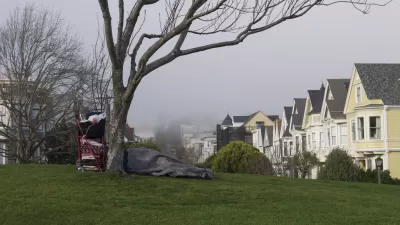In a report detailing three decades of growth in the SF Bay Area, an urban think tank details how commercial growth has been disproportionately in the non-transit accessible suburban office parks. However, SF shares the blame. Solutions are offered.
"San Francisco lagged the region's suburbs in job growth over the last three decades, forcing increasing numbers of commuters to pack highways instead of public transportation even as the dangers of greenhouse gas emissions become increasingly evident, according to "Recentering Work: The Future of Transit-Oriented Jobs in Downtown San Francisco," released by the San Francisco Planning and Urban Research Association."
"When we look at the last 30 years of Bay Area history, it's been a history of increasing commutes by cars, employment spread out and decentralized over a wider and wider area, and a decline of our central cities as a share of all jobs," said Egon Terplan, SPUR policy director and the report's principal author. "We cannot meet regional climate change goals unless we change that pattern."
"But some of the proposals (SPUR offers) are certain to spark controversy, as they directly conflict with recently adopted neighborhood plans and long-standing attitudes toward development in the city.
Most notably, the study suggested easing density and height restrictions in the core downtown area.
"SPUR is way wrong," said Calvin Welch, a longtime San Francisco affordable housing activist, who said developers haven't used the full office allocations."
The nine-county Bay Area doubled its employment since 1970, but San Francisco only accounted for around 4 percent of the growth, according to the SPUR study. In contrast, Santa Clara, Alameda and Contra Costa counties captured 37 percent, 20 percent and 15 percent of the new jobs, respectively."
FULL STORY: Suburban job growth imperils emission goals

Alabama: Trump Terminates Settlements for Black Communities Harmed By Raw Sewage
Trump deemed the landmark civil rights agreement “illegal DEI and environmental justice policy.”

Study: Maui’s Plan to Convert Vacation Rentals to Long-Term Housing Could Cause Nearly $1 Billion Economic Loss
The plan would reduce visitor accommodation by 25% resulting in 1,900 jobs lost.

Planetizen Federal Action Tracker
A weekly monitor of how Trump’s orders and actions are impacting planners and planning in America.

Wind Energy on the Rise Despite Federal Policy Reversal
The Trump administration is revoking federal support for renewable energy, but demand for new projects continues unabated.

Passengers Flock to Caltrain After Electrification
The new electric trains are running faster and more reliably, leading to strong ridership growth on the Bay Area rail system.

Texas Churches Rally Behind ‘Yes in God’s Back Yard’ Legislation
Religious leaders want the state to reduce zoning regulations to streamline leasing church-owned land to housing developers.
Urban Design for Planners 1: Software Tools
This six-course series explores essential urban design concepts using open source software and equips planners with the tools they need to participate fully in the urban design process.
Planning for Universal Design
Learn the tools for implementing Universal Design in planning regulations.
Caltrans
Smith Gee Studio
Institute for Housing and Urban Development Studies (IHS)
City of Grandview
Harvard GSD Executive Education
Toledo-Lucas County Plan Commissions
Salt Lake City
NYU Wagner Graduate School of Public Service




























